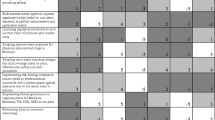Abstract
In this last article in the series the authors focus on the issue of researching and evaluating pharmaceutical policy. The past five articles made an argument for why pharmaceutical policy is important and why it is different from health policy. The evidence base needed for pharmaceutical policymaking is also somewhat specialized in relation to health policy. Taking these differences into consideration the authors provide their definition of pharmaceutical policy. The knowledge base for good pharmaceutical policymaking needs to be broad and include approaches and methodologies ranging from the highly quantitative and experimental to the purely qualitative. Other policy questions such as those concerned with rational use of medicines and economics illustrate that pharmaceutical policy needs more varied approaches than randomized clinical trials alone can provide. The importance of gaining a thorough overview and understanding of the available design and methodological options for policy analysis is emphasized. Research into pharmaceutical policy has many commonalities with evaluation and policy analysis. Some of the main pitfalls that policymakers, researchers and analysts can fall into when formulating and evaluating pharmaceutical policy are discussed and include: using too narrow evaluation questions; choosing inappropriate methods/designs; and the problem of bias and self-censorship. The␣authors conclude this series by advocating a strong focus on research and an international evaluation culture around pharmaceutical policy. They emphasize the importance of pharmaceutical specialists’ (i.e., pharmacists’) involvement in pharmaceutical policy analysis and the policy consultative process.
Similar content being viewed by others
References
Traulsen JM, Almarsdóttir AB. The argument for pharmaceutical policy. Pharm World Sci 2005; 27:7–12
Shulock N. The paradox of policy analysis: if it is not used, why do we produce so much of it? J Pol Anal Mgt 1999; 18(2):226–244
Drummond M, Brown R, Fendrick AM, Fullerton P, Neumann P, Taylor R, Barbieri M. Use of pharmacoeconomics information—report of the ISPOR Task Force on use of pharmacoeconomic/health economic information in health-care decision making. Value Health 2003; 6(4):407–416
Smith F. Research methods in pharmacy practice. London: Pharmaceutical Press; 2002. p. 203–277
Traulsen JM, Klinke BO. Using health technology assessment to put pharmaceutical care on the political agenda. Pharm World Sci 2004; 26(2):61–63
Cook TD, Campbell DT. Quasi-experimentation designs and analysis issues for field settings. Boston: Houghton Mifflin Company; 1979. p. 6
Almarsdóttir AB, Morgall JM, Grímsson A. Cost containment of pharmaceutical use in Iceland: the impact of liberalisation and user charges. J Health Serv Res Policy 2000; 5(2):109–113
Almarsdóttir AB, Grímsson A. Over-the-counter codeine use in Iceland: the impact of increased access. Scand J Public Health 2000; 28:270–274
Morgall JM, Almarsdóttir AB. No struggle, no strength: how pharmacists lost their monopoly. Soc Sci Med 1999; 48:1247–1258
Almarsdóttir AB, Morgall JM. Technicians or patient advocates?— still a valid question. (results of focus group discussions with pharmacists). Pharm World Sci 1999; 21(3):127–131
Almarsdóttir AB, Morgall JM, Grímsson A. Professional responsibility for patient welfare. Is it possible to legislate pharmaceutical care? J Soc Admin Pharm 2001; 18(2):45–50
Almarsdóttir AB, Björnsdóttir I, Morgall Traulsen J. Pharmacists in a liberalised system—results from a profession-wide survey in Iceland. Int J Phar Practice 2002; 10:47–53
Almarsdóttir AB, Morgall JM, Björnsdóttir I. A question of emphasis: efficiency or equality in the provision of pharmaceuticals. Int J Health Plan Manage 2000; 15:149–161
Morgall Traulsen J, Almarsdóttir AB, Björnsdóttir I. The lay user perspective on the quality of pharmaceuticals, drug therapy, and pharmacy services. Pharm World Sci 2002; 24:4
Larsen JB, Mount J, Kruse PR, Vrangbæk K. Dynamics of pharmacy regulation in Denmark, 1546–1932: a study of profession-state relations. Pharm Hist 2004; 46:3–25
Larsen JB, Mount J, Kruse PR, Vrangbæk K. Dynamics of pharmacy regulation in Denmark, 1932–1994: a study of profession-state relations. Pharm Hist 2004; 46:3–25
Larsen JB, Vrangbæk K, Traulsen JM. Advocacy coalitions and pharmacy policy in Denmark: solid cores with fuzzy edges. Soc Sci Med 2006 (in press) (accepted Dec. 05)
Noerreslet M, Larsen JB, Traulsen JM. The medicine user—lost in translation? Analysis of the official political debate prior to the deregulation of the Danish medicine distribution system. Soc Sci Med 2005; 61:1733–1740
Dunn WN. Public policy analysis. Englewood Cliffs, NJ: Prentice Hall; 1981
Trochim WM. The research methods knowledge base. 2nd ed. Internet WWW page, at URL:<‰http://www.socialresearchmethods.net/kb/> (version current as of August 16, 2004)
Patton MQ. Qualitative evaluation and research methods. 2nd ed. London: Sage Publications; 1990
Meyer J. Qualitative research in health care: using qualitative methods in health related action research. BMJ 2000; 320(7228):178–181
Pope C, Ziebland S, Mays N. Qualitative research in health␣care: analysing qualitative data. BMJ 2000; 320(7227):114–6
Mays N, Pope C. Qualitative research in health care: assessing quality in qualitative research. BMJ 2000; 320(7226):50–52
Hanney SR, Gonzalez-Block MA, Buxton MJ, Kogan M. They utilisation of health research in policy-making: concepts, examples, and methods of assessment—A report to the Research Policy and Co-operation Department, World Health Organization, Geneva. HERG Research Report No. 28. Uxbridge, Middlesex: Brunel University; 2002
Campbell DT. Reforms as experiments. Am Psychol 1969; 24:409–429
Davies P. Internationalisation as context for systematic reviews. Presentation at the Campbell Collaboration Colloquium, Stockholm, Sweden, February 27, 2003
The Cochrane Library. Pharmaceutical policies: effects on rational drug use. The Cochrane collaboration, Reprint of a Cochrane review, prepared and maintained by CC. Published in The Cochrane Library 2004, Issue 2. 2004
Acknowledgements
The authors wish to thank to the anonymous reviewers who, through their comments, had a significant impact on the final shape of the articles in the series. We wish to extend our sincere thanks to the editor of PWS for his constructive handling of the reviewers’ comments and for being there for us all the way.
Author information
Authors and Affiliations
Corresponding author
Rights and permissions
About this article
Cite this article
Almarsdóttir, A., Traulsen, J. Studying and evaluating pharmaceutical policy—becoming a part of the policy and consultative process. Pharm World Sci 28, 6–12 (2006). https://doi.org/10.1007/s11096-006-9011-0
Received:
Accepted:
Published:
Issue Date:
DOI: https://doi.org/10.1007/s11096-006-9011-0




